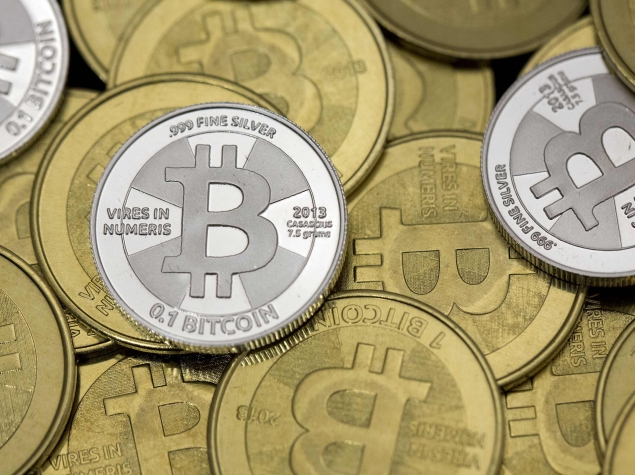- Home
- Internet
- Internet News
- Mt. Gox Bitcoin exchange website goes offline as currency value plummets
Mt. Gox Bitcoin exchange website goes offline as currency value plummets

Visitors to the www.mtgox.com domain got a blank page when they tried to log on, more than two weeks after the firm suspended cash withdrawals as claims swirled of a bug in the software underpinning Bitcoin.
The website failure came after Japanese regulators said they were powerless to intervene in an episode that has cast doubt on the viability of the crypto-unit.
"We are not in position to take action" over the problem, said a spokesman for the Financial Services Agency of Japan, which regulates financial institutions such as banks, insurers and brokerage houses.
Consternation has grown since MtGox stopped processing external transactions on February 7, claiming there was a problem with the programme that powers the currency, and allows it to be transferred between users or swapped for goods and services.
The value of the unit on the exchange has gone into freefall since then. Around midday on Tuesday, a Bitcoin was worth $135, compared with the $522 quoted by the CoinDesk Bitcoin price index, which tracks the price of the currency on major exchanges.
In January a Bitcoin was worth more than $900 at MtGox, one of the world's oldest exchanges for the unit.
Wild volatility has long been a part of the experimental digital currency, which does not have backing of a central bank or government and falls outside of traditional financial regulatory frameworks.
Units are generated by a complex computer algorithm designed by one or more anonymous people in 2009, with a global cap on the eventual number of Bitcoins set at 21 million units.
Proponents say the currency is an efficient and anonymous way to store and transfer monetary value, and to avoid the risks inherent in any currency dependent on the viability of a government for its value.
But some economists say the project is mired in difficulties, including large fluctuations in value caused by speculators and a supposed vulnerability to online thieves.
Others note that the anonymity it offers is attractive to underworld figures and cite the unit's use on the underground Silk Road website, where it was used to buy drugs and guns.
MtGox, which has not responded to repeated AFP requests for comment, issued a statement last week saying it had moved its headquarters within Tokyo due to "security problems" and was still working on "re-initiating Bitcoin withdrawals".
It did not give details of the security problems.
"The move, combined with some other security and technical challenges, pushed back our progress," the firm said Thursday in their most recent public statement.
Earlier this month, the company brought down its system and stopped processing client requests to withdraw money held at its "wallet", citing a problem with the technology.
Since then, MtGox said it had "implemented a solution" to the problems and insisted customers' assets were safe, but has not been able to announce the completion of its repair work.
However, the apparent failure of the website on Tuesday will bring little comfort to investors, some of whom have tens of thousands of dollars' worth of the crypto-currency tied up in Tokyo.
Bitcoin supporters say the digital currency itself is safe and the problems lie with MtGox, which they claim cannot process a high volume of transactions.
This week, MtGox CEO Mark Karpeles resigned from the board of the Bitcoin Foundation, which advocates for the virtual currency, as he faces severe criticism from his industry colleagues and investors.
A handful of MtGox clients have staged small protests outside the firm's headquarters, but say they have not received any reassurances over whether or not their money is safe.Catch the latest from the Consumer Electronics Show on Gadgets 360, at our CES 2026 hub.
Related Stories
- Samsung Galaxy Unpacked 2025
- ChatGPT
- Redmi Note 14 Pro+
- iPhone 16
- Apple Vision Pro
- Oneplus 12
- OnePlus Nord CE 3 Lite 5G
- iPhone 13
- Xiaomi 14 Pro
- Oppo Find N3
- Tecno Spark Go (2023)
- Realme V30
- Best Phones Under 25000
- Samsung Galaxy S24 Series
- Cryptocurrency
- iQoo 12
- Samsung Galaxy S24 Ultra
- Giottus
- Samsung Galaxy Z Flip 5
- Apple 'Scary Fast'
- Housefull 5
- GoPro Hero 12 Black Review
- Invincible Season 2
- JioGlass
- HD Ready TV
- Laptop Under 50000
- Smartwatch Under 10000
- Latest Mobile Phones
- Compare Phones
- OPPO A6 Pro 5G
- OPPO A6s
- OPPO Reno 15 Pro Max
- Honor Win RT
- Honor Win
- Xiaomi 17 Ultra Leica Edition
- Xiaomi 17 Ultra
- Huawei Nova 15
- Asus ProArt P16
- MacBook Pro 14-inch (M5, 2025)
- OPPO Pad Air 5
- Huawei MatePad 11.5 (2026)
- Xiaomi Watch 5
- Huawei Watch 10th Anniversary Edition
- Acerpure Nitro Z Series 100-inch QLED TV
- Samsung 43 Inch LED Ultra HD (4K) Smart TV (UA43UE81AFULXL)
- Asus ROG Ally
- Nintendo Switch Lite
- Haier 1.6 Ton 5 Star Inverter Split AC (HSU19G-MZAID5BN-INV)
- Haier 1.6 Ton 5 Star Inverter Split AC (HSU19G-MZAIM5BN-INV)

















